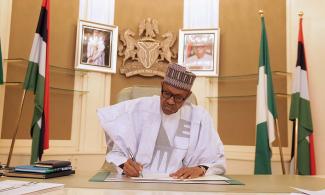
1. It deals with the preservation of suspicious assets connected with corruption and other relevant offences.
This may lead to political vendetta, witch-hunt and selective punishment. While some former political office holders’ assets have been confiscated by Federal Government for this reason (Diezani Alison Madueke, Sambo Dasuki, etc) some names, such as Ayo Oke, former Director-General of the National Intelligence Agency (NIA) and Babachir Lawal, former Secretary to the Federal Government (SGF) of the infamous grass-cutting scandal are conspicuously missing from the list.

On Sunday, October 14, 2018, the media uncovered the Muhammadu Buhari-led administration’s watch list of 50 high-profile Nigerians. These people are to be restricted to the shores of this country pending the determination of their cases.
The order was in exercise of a presidential privilege called Executive Order, which is not enshrined in the Constitution. Since the release of the list, opinions have been divided as to the sincerity and constitutionality of the action. While some people believe that fairness is not a long-suit of the Buhari Administration and the execution of the order might devolve into tyranny, some think corruption should be fought regardless of the means used.
Here are seven things you should know about the Executive Order 6
1. It deals with the preservation of suspicious assets connected with corruption and other relevant offences.
This may lead to political vendetta, witch-hunt and selective punishment. While some former political office holders’ assets have been confiscated by Federal Government for this reason (Diezani Alison Madueke, Sambo Dasuki, etc) some names, such as Ayo Oke, former Director-General of the National Intelligence Agency (NIA) and Babachir Lawal, former Secretary to the Federal Government (SGF) of the infamous grass-cutting scandal are conspicuously missing from the list.
2. It is out to tackle corruption, which is believed to constitute an unusual and extraordinary threat to the well-being, national security and stability of the country’s political and economic systems.
The essence of power separation will be defeated by the dictates of the executive order. The interpretation of the law belongs to the judiciary and once the judiciary makes its pronouncement, it should stand. A violation of the pronouncement of the court is the reason Dasuki still remains incarcerated.
3. The order gives the Attorney-General of the Federation power to coordinate the implementation of its stipulations and subsume enforcement agencies under the office of the Attorney-General.
If this is carried out to the letter, we are bound to witness cases similar to Abdulrasheed Maina’s. The former Chairman of the Presidential Task Team on Pension Reforms was reinstated through the backdoor by the Attorney-General of the Federal in connivance with Minister of Interior.
4. The order extends the scope of corruption to cover “other relevant offences, including terrorism, financing of terrorism, kidnapping, sponsorship of ethnic or religious violence, economic sabotage, cases of economic and financial crimes, and an unclear category of “acts of contributing to the economic adversity of the Federal Republic of Nigeria”.
This might give birth to many cases reminiscent of Ibrahim El-zakzaky’s, in which the nature and name of charges are at the discretion of Federal Government. The list of crimes the man is supposedly charged with keeps piling up, informed by the whims and caprices of the power that be.
5. It wields the big stick and shifts blame; it threatens the head of agencies with sanctions for any failure to comply with it.
The accusations and counter-accusations that trailed the invasion of the National Assembly during the tenure of Lawal Daura as Director-General of the Department of State Services (DSS) still sticks in people’s mind.
6. The Executive Order purports without prejudice to any laws or existing suits, to protect from dissipation the assets of any Nigeria citizens within the territory of the Federal Republic of Nigeria known to be a current or former government official or a politically exposed person, who is or has been complicit in or has engaged in corrupt practices.
Again, this is hijacking the function of the judiciary. The judiciary, despite its many sins in recent times, has not been found wanting in this regard. The court asked that Diezani’s property be forfeited.
7. The Executive Order has no place in the Nigerian Constitution
The constitution is the norm in any democracy; it is there to guide and guard and once its contents are suspended the citizens become vulnerable and democracy, except by name only, ceases to be one.